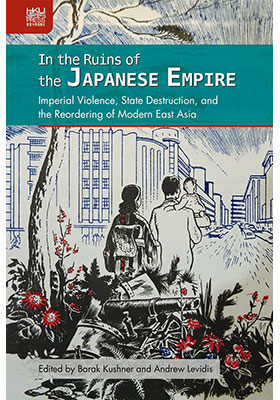In the Ruins of the Japanese Empire
Imperial Violence, State Destruction, and the Reordering of Modern East Asia
(日本帝國的崩解:帝國暴力、國家毀滅與戰後東亞秩序的重整)
ISBN : 978-988-8528-28-8
February 2020
252 pages, 6″ x 9″
- HK$500.00
Ebooks
Also Available on
In the Ruins of the Japanese Empire concludes that early East Asian Cold War history needs to be studied within the framework of post-imperial history. Japan’s surrender did not mean that the Japanese and former imperial subjects would immediately disavow imperial ideology. The end of the Japanese empire unleashed unprecedented destruction and violence on the periphery. Lives were destroyed; names of cities altered; collaborationist regimes—which for over a decade dominated vast populations—melted into the air as policeman, bureaucrats, soldiers, and technocrats offered their services as nationalists, revolutionaries or communists. Power did not simply change hands swiftly and smoothly. In the chaos of the new order, legal anarchy, revenge, ethnic displacement, and nationalist resentments stalked the postcolonial lands of northeast Asia, intensifying bloody civil wars in societies radicalized by total war, militarization, and mass mobilization.
Kushner and Levidis’s volume follows these processes as imperial violence reordered demographics and borders, and involved massive political, economic, and social dislocation as well as stubborn continuities. From the hunt for “traitors” in Korea and China to the brutal suppression of the Taiwanese by the Chinese Nationalist government in the long-forgotten February 28 Incident, the research shows how the empire’s end acted as a catalyst for renewed attempts at state-building. From the imperial edge to the metropole, investigations shed light on how prewar imperial values endured during postwar Japanese rearmament and in party politics. Nevertheless, many Japanese actively tried to make amends for wartime transgressions and rebuild Japan’s posture in East Asia by cultivating religious and cultural connections.
“This third book to emerge from Barak Kushner’s massive collaborative research project on the dissolution of Japan’s empire lays out a new geography of turning the ruins into social, economic, political, and cultural opportunities across Northeast Asia, and with lasting consequences. This book will change the way we research and teach ‘1945’ in a global context.” —Franziska Seraphim, Boston College
“Writing imperial history, linking the prewar to postwar, is perilous because it must resist domestic taboos and social pressures. Today’s global society, where history incites extreme nationalism and serves as catalyst for conflict, calls for the creation of a new history of the end of empire as Kushner and his team have done in this volume.” —ASANO Toyomi, Waseda University
Reviews
The Journal of Japanese Studies
Volume 49, Number 1, Winter 2023, pp. 247-251
https://muse.jhu.edu/pub/44/article/880780




